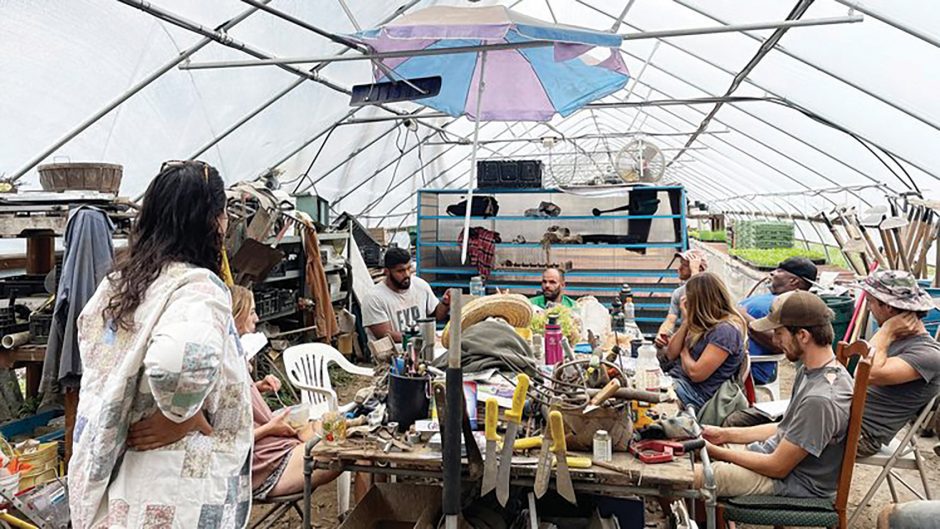An organisation has been formed to try to build a new wave of fully unionised worker co-ops “that have unions at the core of their democracy”.
Union-coops:uk says it wants to encourage mutually beneficial collaboration between the union and co-op movements through the union co-op model – which has already been put to work in parts of the US, such as Cincinnati, Ohio. “We believe the union co-op model is a powerful tool to counter mainstream economic narratives,” they say. “It is a living example that another way is possible.”
The group held a meeting at Wortley Hall, near Sheffield, in May – with participants Andy Birchall, Colm Massey, Cilla Ross, Alex Bird, Mick McKeown, Martin Strube, Gareth Crockett, John Merritt, Simon Taylor, Chris Croome, Graham Mitchell, Fredy Velez, Anita Mangan, Niall Mulholland, Siôn Whellens, Miguel Martínez-Lucio, Cath Muller and Sarah Woolley. After the meeting Co-op News put some questions to the group, with answers compiled by Anita Mangan, from the University of Bristol.
You are looking to see more worker co-op conversions with union support. How do you hope to achieve this?
Union-co-ops exist elsewhere in the world but we need one in the UK as ‘proof of concept’. This means working together with a trade union, a co-operative, and co-operative and union development experts and organisers. This union co-op could then offer a flexible template for union supported worker co-op conversions.
There is some work to be done to work out how to make that argument to the trades unions, who pass all the ICA principles and who share similar values and principles with co-operators. Importantly, we need to allay the understandable fears of trade unions that co-operatives are not about driving a mutual agenda. In other words, we need to reassure unions that union co-ops are not privatisation by stealth. At the same time co-operators need to be encouraged to explore the benefits of being unionised.

What are your first steps?
Union-coops:uk is a campaigning organisation which has spent the past few years raising awareness about the benefits of the union co-op model. In July 2020 we launched our Manifesto for Decent Work. Since then we have hosted a series of online seminars with national and international speakers, focused on different aspects of the union co-op model. Musician
Related: Community power at Cooperation Town
Most recently, we held a residential strategy round table in Wortley Hall that explored how to develop union co-ops in the UK. The participants included union and co-operative activists who have taken on responsibility to develop key areas such as communications, finance, democracy, education and technology. The aim is to promote the union co-ops model at the autumn conferences.
How can relations between the union and co-op movements be improved? Which unions are likely to be most amenable to the idea?
There is a long history of shared activism and solidarity between co-operatives and unions that people have forgotten about. Many in both movements are committed to alternative models of ownership and control. We need to bridge the gap with new approaches, arguments and information. For example, co-ops can be part of union renewal. Unionisation in turn can offer support and organisation to co-operatives and reduce any danger of a ‘race to the bottom’ in terms and conditions for co-operators. They can also address in-work poverty (eg trade union credit unions). Union co-ops are a chance for renewal for both movements to address pressing social, economic and environmental crises.
Education is key to bridging the gap between unions and co-ops. There have been numerous efforts over the years to get unions and co-ops talking to each other. Lots of workers are scared or reluctant to of taking on management responsibilities, but the unions could encourage workers to feel able to take on those roles. We need education and support to do it.
The Bakers Food and Allied Workers Union (BFAWU) and Musicians’ Union have given strong support to the union co-ops model. BFAWU general secretary Sarah Woolley is actively involved in union co-op discussions and has spoken at several events. Other supportive unions include Equity and BECTU.
At the meeting several people suggested that co-ops and unions are 19th century models. How would a union co-op model better answer 21st century challenges?
The 19th century models developed, as social movements always do, in response to need. But the range of injustices, including in-work poverty and food security issues are problems that are still with us today. Yet while democracy, voice, participation, mutual support and equality between members are at the heart of the 19th century models, the vocabulary does not necessarily translate to a 21st century audience. For example, it could be argued that worker co-ops are already unions (worker unions). Worker unions as a term has less baggage and we see great benefit in using this term. Language is exciting in terms of power and democracy, but needs to be used carefully.
We are stuck in structures that were developed 200 years ago and they need to be changed. On the other hand, the bureaucratic structures have democracy built into them. Part of the problem is that 30 years of neoliberalism has meant that it is the older activists who have been holding the line. This is beginning to change as there is a yearning for some kind of socialism, very broadly defined. We are battling against the decline of terms & conditions and rise of neoliberal ideology. Education is essential as there is a wealth of historical information we can draw on.
What barriers would the development of this model face?
Apart from creating dialogue between unions and co-ops, the key barriers are legislation and education. We need to educate union activists, co-operators, workers and business development agencies about the union co-op
model. At the same time, we also need to influence policy makers so that union co-ops are presented as a viable alternative for business start-ups and conversions.